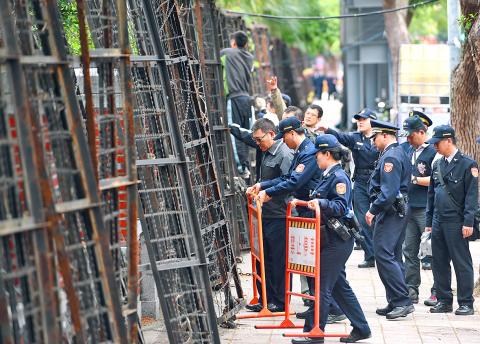As the nation commemorates the anniversary of the Sunflower movement, civic groups are calling for renewed attention on the legislative progress of a proposed cross-strait agreement oversight bill.
The passage of an oversight bill was one of the three main demands of last year’s landmark protests, which were triggered by Chinese Nationalist Party (KMT) Legislator Chang Ching-chung’s (張慶忠) attempt to ram through the proposed service trade pact with China within 30 seconds.
Tens of thousands of protesters took to the streets in March and early April last year, demanding an oversight bill that would set clear legal parameters for future cross-strait negotiations.

Photo: Liao Chen-huei, Taipei Times
With eight versions of the proposed oversight bill currently under legislative review, civic groups yesterday held a public forum outside of the Legislative Yuan in Taipei last night, inviting members of the public to participate in discussions on the issue.
While the Executive Yuan has been touting its own version of the oversight bill, civic groups and the Democratic Progressive Party (DPP) said that the government’s version lacked teeth and “failed to provide any meaningful oversight.”
The remaining seven versions were proposed by: the DPP legislative caucus; the Taiwan Solidarity Union (TSU) legislative caucus; KMT Legislator Johnny Chiang (江啟臣); DPP Legislator Lee Ying-yuan (李應元); DPP Legislator Cheng Li-chiun (鄭麗君); DPP Legislator Pasuya Yao (姚文智); and a joint proposal by DPP Legislator Yu Mei-nu (尤美女) and civic groups.
The Economic Democracy Union, the main organizer of the forum, said that the Mainland Affairs Council declined its invitation to attend the event on the grounds that it had already hosted an online public forum on Wednesday night.
About 150 people trickled into the forum’s outdoor venue last night to participate in the event, which featured the four DPP legislators explaining their version of the act, as well as TSU caucus whip Lai Chen-chang (賴振昌).
The forum converged on a discussion of three issues: the oversight bill’s wording in defining cross-strait relations; the bill’s stance on human rights issues; and its provisions on the Legislative Yuan’s authority in monitoring cross-strait negotiations.
Taiwan Democracy Watch convener Hsu Wei-chun (徐偉群) said that the Executive Yuan’s version was detrimental to the nation’s sovereignty, as it classified Taiwan and China as parts of the same country under the KMT’s framework of “one country, two areas.”
He said versions that defined the two entities simply as China and Taiwan were acceptable, while versions employing the terms “People’s Republic of China” and “Republic of China” should be considered as “the bottom line.”
Cheng said that the oversight bill has been stuck in limbo at the Legislative Yuan’s plenary session, saying that the executive yuan’s refusal to withdraw its version of the oversight bill has prevented further substantive discussions

Chinese Nationalist Party (KMT) Chairman Eric Chu (朱立倫), spokeswoman Yang Chih-yu (楊智伃) and Legislator Hsieh Lung-chieh (謝龍介) would be summoned by police for questioning for leading an illegal assembly on Thursday evening last week, Minister of the Interior Liu Shyh-fang (劉世芳) said today. The three KMT officials led an assembly outside the Taipei City Prosecutors’ Office, a restricted area where public assembly is not allowed, protesting the questioning of several KMT staff and searches of KMT headquarters and offices in a recall petition forgery case. Chu, Yang and Hsieh are all suspected of contravening the Assembly and Parade Act (集會遊行法) by holding

PRAISE: Japanese visitor Takashi Kubota said the Taiwanese temple architecture images showcased in the AI Art Gallery were the most impressive displays he saw Taiwan does not have an official pavilion at the World Expo in Osaka, Japan, because of its diplomatic predicament, but the government-backed Tech World pavilion is drawing interest with its unique recreations of works by Taiwanese artists. The pavilion features an artificial intelligence (AI)-based art gallery showcasing works of famous Taiwanese artists from the Japanese colonial period using innovative technologies. Among its main simulated displays are Eastern gouache paintings by Chen Chin (陳進), Lin Yu-shan (林玉山) and Kuo Hsueh-hu (郭雪湖), who were the three young Taiwanese painters selected for the East Asian Painting exhibition in 1927. Gouache is a water-based

Taiwan would welcome the return of Honduras as a diplomatic ally if its next president decides to make such a move, Minister of Foreign Affairs Lin Chia-lung (林佳龍) said yesterday. “Of course, we would welcome Honduras if they want to restore diplomatic ties with Taiwan after their elections,” Lin said at a meeting of the legislature’s Foreign Affairs and National Defense Committee, when asked to comment on statements made by two of the three Honduran presidential candidates during the presidential campaign in the Central American country. Taiwan is paying close attention to the region as a whole in the wake of a

OFF-TARGET: More than 30,000 participants were expected to take part in the Games next month, but only 6,550 foreign and 19,400 Taiwanese athletes have registered Taipei city councilors yesterday blasted the organizers of next month’s World Masters Games over sudden timetable and venue changes, which they said have caused thousands of participants to back out of the international sporting event, among other organizational issues. They also cited visa delays and political interference by China as reasons many foreign athletes are requesting refunds for the event, to be held from May 17 to 30. Jointly organized by the Taipei and New Taipei City governments, the games have been rocked by numerous controversies since preparations began in 2020. Taipei City Councilor Lin Yen-feng (林延鳳) said yesterday that new measures by